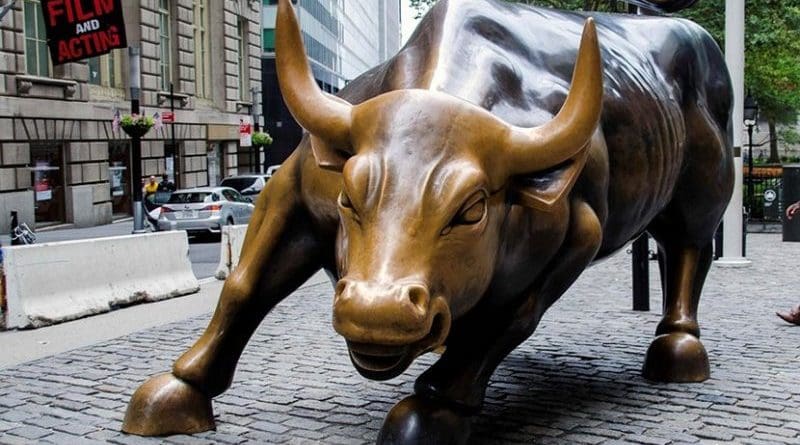Choice Between Lives And The Economy A False Dichotomy – OpEd
By Arab News
By Kerry Boyd Anderson*
As the coronavirus disease (COVID-19) takes lives and slams economies, there is a debate in some countries about whether the measures taken to slow the virus’s spread — such as social distancing, closing schools and businesses, and asking people to self-quarantine — are worth the severe economic toll.
In March, US President Donald Trump tweeted: “We cannot let the cure be worse than the problem itself.” The lieutenant governor of Texas said that people should go back to work and that older citizens should be willing to risk their health in order to avoid massive damage to the American way of life. Brazilian President Jair Bolsonaro, who has gone further than most world leaders in downplaying the threat of the virus, said last week that “the collateral effects of the measures to fight the coronavirus cannot be worse than the actual illness.” In multiple countries, leaders were slow to implement measures that could help mitigate COVID-19’s spread for fear of the economic impacts.
Both the threat that COVID-19 poses to public health and its economic consequences are very real and deeply worrying. Countries will have to find a balance between the measures that are necessary to limit deaths and illness and the impact on the economy of closing down businesses, schools, restaurants, religious services, and more.
Some leaders and commentators have set up a false dichotomy between saving lives and saving the economy. On one side, some say that societies must do whatever is necessary to save lives, even if that means shutting down most economic activity for months or more until a vaccine is available. A few argue that prioritizing the economy means prioritizing money over lives. However, the economy is about lives — the ability of people to pay rent or a mortgage, to buy food, to afford health care, and so on.
On the other extreme are those who say that society should accept a higher death toll in exchange for keeping the economy going. Aside from ethical issues, the fundamental flaw in this argument is that the pandemic is the cause of economic woes, not the measures designed to mitigate its effects. Even if governments choose to leave schools, businesses and more open, people would not engage in normal economic activity. Large numbers of people would die, thus damaging the economy. Many others would be very sick, which would require more people to care for them. All of this would negatively affect workforces and reduce productivity. Outside of health care, it would also reduce consumption. Many people would avoid going out in public out of fear of contracting the virus, further limiting economic activity. Even if one country decided to try this approach, others might sever travel and trade links out of concern that the virus would spread further in their own country, therefore damaging trade and disrupting supply chains.
There is no scenario in which an economy functions normally during a pandemic. It is the pandemic that is hurting economies. The faster the pandemic is brought under control, the sooner people will be able to return to normal economic activity.
Fortunately, some recent research suggests that social distancing and other mitigation measures might not only save lives, but also help the economy recover faster. A recent paper by prominent economists Sergio Correia, Stephan Luck and Emil Verner analyzed data from the 1918 influenza epidemic in the US and found that cities that instituted mitigation measures early in the pandemic and for longer periods of time not only had lower death rates but also appeared to have limited “the adverse economic consequences of a pandemic.” In other words, the pandemic negatively affected the economy, but the cities that implemented social distancing and other mitigation measures recovered faster economically. There are significant differences between that pandemic and COVID-19, and between the global economy of 1918 and today, but the study suggests that tackling the spread of a virus likely boosts economic recovery when the crisis is over.
Of course, even while recognizing that the virus is the cause of economic pain, the measures needed to contain it are difficult for people to bear and cannot be in place indefinitely. Experts are working on plans to find a balance between the need to combat the virus and the need to allow people to get back to work. The American Enterprise Institute, a Washington-based think tank, recently produced a detailed plan that proposes phases with clear benchmarks that would allow US states and localities to gradually lift restrictions once they reach specific metrics, such as testing and health care capacity and reduced infection rates. Other economists have proposed a gradual return to business once widespread testing is available and infection rates are under control.
The reality is that the world will have to practice a balance between COVID-19 containment and economic recovery. The global economy and countries’ own economies will not fully recover until societies have better control over COVID-19, and that will require social distancing and other mitigation measures. Societies and individuals will not fully recover until they can safely return to work. Balancing these realities is a tall order, but there are emerging plans to help governments do so. If countries take actions to contain the virus, then the pandemic will be over sooner and economies can return to normal faster.
- Kerry Boyd Anderson is a writer and political risk consultant with more than 16 years’ experience as a professional analyst of international security issues and Middle East political and business risk. Her previous positions include deputy director for advisory with Oxford Analytica and managing editor of Arms Control Today. Twitter: @KBAresearch

